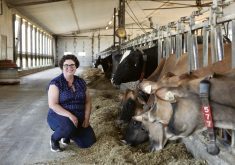Relationships are a lot of work. They always are. Adding a farm or ranch to the mix just makes it that much harder. And if the farm is a multi-generation operation, the hill gets that much higher again.
So, how do couples and extended families protect the family farm in case a relationship dissolves? Can they even do that?
The answer is yes. But the answer is also that it doesn’t just happen. It takes open communication, setting expectations, and being proactive with documentation and legal agreements.
Read Also

Five reasons why you avoid farm bookkeeping
Bookkeeping for the farm business might not be anyone’s favourite chore, but staying on top of it can help your farm access the funds it needs to grow.
Cathy Regier, family lawyer with Pritchard & Company LLP in Medicine Hat, Alta., has clear advice. “When a relationship gets serious enough to live together or get married, provisions need to be set in place to protect everyone, and ultimately the farm business,” Regier says.
Then she adds her second recommendation:
“The best time to talk about tough topics like separation and divorce is when everyone likes each other and gets along.”
It’s never easy to broach the subject of ‘what if’ in any relationship, but when the farm and family business could be at stake, tough conversations are a must.
Tackling tough conversations
Regier begins by talking about two of the flashpoints that lead to divorce: spending habits and parenting. To make sure everyone is on the same page, topics like whether the couple are aligned on how they will spend and save their money and how they will raise their children must be explored early in the relationship.
Regier reports an upsurge in family law files (separations and divorce) as a result of the pandemic. “In many of these cases, people spent more time with each other than ever and realized their parenting styles were different,” she says.
And now, with today’s farm economy, some couples are seeing each other’s spending habits in a new, unflattering light.
“Have those frank discussions about handling money, if and how you want to raise children, and future life goals early in a relationship to avoid any unpleasant surprises,” Regier tells couples, especially if they will be farming and raising families on farms or ranches together.
She notes farm kids have a very different relationship to the world around them compared to non-farm kids, like working with animals or operating machinery at a younger age. And if a non-farming parent isn’t comfortable with such exposure, it’s easy to see how disagreements may arise — and how they could have been prevented.
The same goes for a non-farming spouse who doesn’t understand farm finances, like why the farm operation makes large lump sum payments on loans or requires higher debt loads.
Darrell Wade, farm advisor and founder of Farm Life in Peterborough, Ont., says discussing finances early in a relationship is essential in order to understand each other’s perspectives and values around money. He also advises these conversations extend to existing family farm values around business management and ownership and making sure the partner entering into the farm is aware of any agreements, plans or strategies that the farm is using for long-term planning.
For example, if the plan is for the farm to take care of Mom and Dad in retirement, then anyone entering the farm and family dynamics should be aware of this so they can understand how it affects them personally and how it will have an impact on farm profitability, cash flow or housing arrangements.
Again, it pays to be proactive. If a partner comes from a non-farming background, taking the time to explain the complexities of the farm’s finances, business structure and decision-making process will go a long way to preventing assumptions and unrealistic expectations from taking root.
Sign a contract
“Entering a cohabitational relationship with your eyes wide open is the best advice family law and farm advisors can offer,” says Carolyn Lloyd, partner and family lawyer with Lerners LLP in London, Ont., who explains that assets, including property, farm shares and trust claims, must be equally divided if relationships dissolve, and if provisions haven’t been made, years and generations of hard work could be lost.
Lloyd says the best way to protect a family farm is to contemplate the effects of any future divorce, and have a contract in place that, in particular, opts out of any farm property division.
The laws around marriage contracts and cohabitation agreements differ by province, but for the most part focus on achieving the same goal by legally documenting how assets will be divided if a couple separates.
Marriage, cohabitation or adult interdependent partnership agreements are legally binding contracts that set the tone for the rules a couple will follow to divide assets and establish spousal support if they separate. The focus of these agreements is equalization, and how a couple’s acquired assets and wealth will be fairly allocated.
Assets owned by each partner entering the agreement can be assessed for value and documented to protect them from division, leaving any accumulated net worth to be divided equally. Specific assets owned by a partner, including property, pensions, farm shares and trust claims can be exempted to protect them from being divided.
The difference between a marriage contract and cohabitation agreement is that marriage is contemplated or has happened and an entitlement to spousal support will start immediately upon marriage. In the case of a cohabitation agreement, the entitlement to spousal support only kicks in after three years or upon the arrival of biological or an adoptive child.
Cohabitation or adult interdependent partnership agreements are designed for couples living together or who depend on each other financially. Even if a couple has no intention of marrying, family law experts advise farming couples to formalize a contract, because after three years of living together or financial interdependence, partners are legally entitled to divide assets if they split. The formalization speeds up if the couple has a biological or adoptive child together, triggering asset equalization ahead of the three-year mark in the event of a separation.
If a couple gets married after signing a cohabitation agreement, that agreement is also deemed to be a marriage contract.
Lloyd says that in most cases, farming couples tend to get married rather than cohabit. This trend reinforces the importance of marriage contracts, especially because spousal support can get tricky when farming couples divorce. “It can be challenging to balance the equalization between paying spousal support and keeping the farm operational,” says Lloyd. “In some cases, couples just stay separated and don’t get divorced to avoid dividing everything.”
After the divorce
“In most cases, couples don’t want to see the result of their divorce or separation interfere with the farm operation or survival of the family farm,” says Lloyd. “Everyone involved typically recognizes the importance of a successful outcome, especially if children are involved, because they want to maintain the family farm for the next generation.”
Proactively protecting the family farm or ranch from a divorce or relationship dissolution can start with the business structure. Incorporated farms can have provisions for allocating spousal shares (or not) and shares in trust for children. If the business supports multiple generations or business partners, Regier recommends the farm management team require a marriage contract before shares are allocated.
“From a business point of view, marriage contracts make sense to protect everyone involved. The problem is, the process can feel bad, like couples are planning for divorce and cause feelings of inadequacy or lack of trust,” says Regier. “But this should be viewed and treated as a business deal, formalizing a person’s entry into the business.”
Marriage contracts can also support the estate and succession planning that is another vital tool for protecting the farm or ranch. Setting expectations and outlining what each spouse is entitled to if they split protects the farm but also protects non-farming siblings who could be concerned about their investment in the farm or their inheritance.
“Dealing with extended families involved in farm operations can be stressful enough when managing day-to-day operations. Add the creation of a marriage contract or a couple getting divorced to that mix, and things can get uncomfortable,” says Regier, who recommends working with a trusted legal advisor to help navigate family dynamics and to clearly communicate expectations to extended family members to avoid assumptions or hard feelings.
“Understanding that there are more than just the two separating parties affected by divorce on the farm is key,” says Wade. “Multiple generations can be affected and the viability of the farm moving forward can be jeopardized.”
There are plenty of options to prevent damage to farm operations or the sale of the farm, like creating trusts and the allocation of farm shares.
Regier also advises farm families to include exemptions in marriage contracts to protect the farm or ranch. These can include exempting the value of owned farmland or the entire farm itself within the marriage contract
Lloyd reminds clients the focus should be on a fair resolution that allows the farm to recover from the divorce, with succession planning for children and future generations to preserve the farm or ranch.
If a divorcing spouse is leaving the farm, they are entitled to a buyout, says Lloyd. “Selling the farm to satisfy the payment of a spouse is catastrophic.”
If it happens
In the event of a relationship separation or divorce, the word “proactive” is one you’ll need to get used to. Being proactive will need to become central to your thinking throughout whatever happens next.
Start this with legal advice.
“Knowledge is power,” says lawyer Cathy Regier. “It’s important to understand your rights and responsibilities so you don’t end up making life-changing decisions later that can cause regrets.”
The second step is to get organized. Collect all financial records, agreements or contracts and be prepared to share those with your separating spouse’s legal team. Regier notes both parties are entitled to know and understand all assets and financial implications — everything the couple owns, has earned or owes over the course of their marriage.
Engaging farm advisors like a chartered business evaluator may also prove beneficial to ensure all property and assets are valued appropriately.
“The divorce process can be difficult, especially on farm families,” says Regier. “It can be hard to satisfy both parties without bankrupting the farm or reducing its viability. It’s a balancing act.”
It’s to be expected emotions may run high throughout a separation or divorce process, especially if children are involved and the family farm or ranch is jeopardized. It’s also fair to assume extended family or farm business partners may be concerned.
Even so, lawyer Carolyn Lloyd advises that couples should keep their private matters private. “It’s stressful enough, and explaining the legal complexities of a divorce can be difficult,” she notes.
Every farming couple prioritizes protecting the family farm and its profitability, no matter what their relationship status. Being patient, respectful, asking questions and open communications are the keys to success at every stage — from formalizing a relationship agreement, through to day-to-day farm management, raising children and, if necessary, separation and divorce.
















